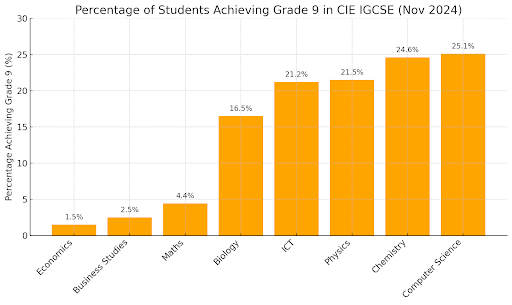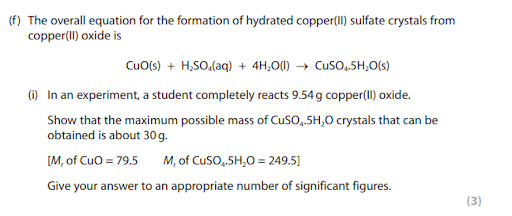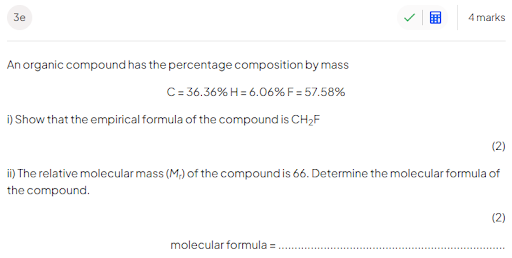Is IGCSE Chemistry Hard?: A Teacher’s Perspective
Written by: Philippa Platt
Reviewed by: Richard Boole
Published
Contents
If you're feeling apprehensive about IGCSE Chemistry, you're not alone. As a teacher, tutor and examiner with over 15 years of experience, I've guided many students through the challenges of this subject. In this article, we'll explore what makes IGCSE Chemistry hard and, more importantly, how you can overcome these hurdles to succeed.
So, Is IGCSE Chemistry Hard?
Like any subject, IGCSE Chemistry has its challenges, but recognising them is the first step to overcoming them. From invisible particles to tricky calculations and hands-on practical work, Chemistry can sometimes feel overwhelming. But these difficulties are completely normal, and thousands of students overcome them every year.
Cambridge (CIE) IGCSE Chemistry (0971) is one of the most widely taken IGCSE Chemistry courses. While this article uses data from the Cambridge (CIE) IGCSE Chemistry (0971) course, the key ideas apply across all IGCSE Chemistry courses including Edexcel IGCSE Chemistry and Oxford AQA IGCSE Chemistry.
The data from the CIE IGCSE Chemistry (9–1) (opens in a new tab) results from the November 2024 session offer useful insights into:
How students perform globally
Whether IGCSE Chemistry deserves its reputation as a challenging subject.
Here’s what the data shows for CIE IGCSE Chemistry:
Grade Range in Nov 2024 | % of Students Achieving This Grade |
Grade 9 | 24.6% |
Grade 7 or above (7–9) | 48.2% |
Grade 5 or above (5–9) | 68.9% |
Grade 4 or above (standard pass) | 79.5% |
Grade 1 or above | 98.7% |
And here are the percentages of students who gained grade 9s in Chemistry compared to other CIE IGCSE subjects.

Bar chart to show the percentage of students achieving Grade 9 across a range of subjects
What does this mean?
You might be surprised that IGCSE Chemistry is one of the top-performing subjects when it comes to high grades. In the latest CIE exam session:
24.6% of students achieved a Grade 9
Beating subjects like Physics (21.5%), Biology (16.5%), and Maths (4.4%)
Over 79% of students passed with a Grade 4 or higher
These figures show that IGCSE Chemistry gives students real opportunities to succeed, especially if you have a consistent approach. Its structured syllabus and frequently tested core topics (like bonding, titrations, and moles) reward regular practice, regardless of exam board.
In fact, compared to subjects like Business Studies (2.5% Grade 9) or Economics (1.5% Grade 9), it seems that Chemistry offers much more opportunity to succeed, especially if you stay consistent.
What Makes IGCSE Chemistry Difficult?
Chemistry combines abstract concepts, mathematical reasoning, and experimental interpretation. But, in my experience, once students begin to understand how the different parts of the course link together, they often:
Find it more manageable
Gain confidence
And, even start to enjoy it.
Let’s have a look at what some students find tricky in IGCSE Chemistry, and why these challenges are completely possible to overcome.
Abstract Concepts
One of the biggest hurdles in Chemistry is understanding particles (atoms, ions, electrons, and molecules) that we can’t see. In the Cambridge (CIE) IGCSE syllabus, for example, students often struggle with understanding how and why ions form.
In the Cambridge (CIE) examiner report for Paper 4 (0971/42, June 2023), examiners said that many students lost marks because they couldn’t explain why Group 2 elements form 2+ ions. This showed that lots of students didn’t fully understand electron structure or how the Periodic Table helps you predict charges, an easy area to fix with a bit of focused revision.
Mathematical Components
Maths plays a significant role in IGCSE Chemistry, and this often catches students by surprise. From calculating moles and concentrations to determining energy changes and yields, many questions involve multiple steps and careful application of formulas. Examiner reports frequently mention common mistakes like:
Failing to convert cm3 to dm3
Rounding errors
Misapplying equations
A great example comes from Edexcel IGCSE Chemistry, June 2019 Paper 1C (opens in a new tab), Question 14f:

An example of a mathematical question that requires multiple steps
Students were asked to calculate the percentage yield of hydrated copper(II) sulfate crystals. The question required them to:
Work out the number of moles of copper(II) oxide used
Calculate the theoretical yield of CuSO5·5H2O
Determine the percentage yield based on the actual mass obtained
This kind of question demands not only a good grasp of stoichiometry and molar mass, but also the ability to sequence steps logically. This is something many students find difficult without regular practice.
Practical Skills
Even if your course doesn’t involve hands-on assessed practicals, experimental skills are still tested in the exam. For example, Cambridge IGCSE (0971) includes the Alternative to Practical (AtP) paper. This assesses your ability to analyse data, draw graphs, describe apparatus, and evaluate methods.
While CIE tests practical skills through the AtP paper, Edexcel and Oxford AQA also include experimental scenarios in their written exams. So, confidence with identifying apparatus, recording and interpreting data, and writing methods is essential across all boards.
In the June 2023 examination series, the Principal Examiner Report (opens in a new tab) highlighted several areas where students commonly lost marks:
Graph Plotting
Many candidates did not plot points accurately or failed to draw appropriate lines of best fit.Data Interpretation
Some students struggled to interpret experimental results correctly, leading to inaccurate conclusions.Apparatus Description
There were instances where candidates could not clearly describe the use of specific laboratory equipment, such as burettes or pipettes.Method Improvement
Suggestions for improving experimental methods were often vague or lacked scientific justification.
How to Overcome the Challenges of IGCSE Chemistry
As a teacher who’s helped students tackle IGCSE Chemistry for over 15 years, I can promise you that struggling with the subject at first is completely normal. The good news? I can confidently say that all of these challenges (abstract ideas, maths skills and practical reasoning) are completely manageable with the right strategies.
Here’s how to make progress in the areas students often find most difficult:
Make Abstract Ideas Visual and Logical
Struggling to picture atoms and ions? You’re not alone. Chemistry often asks you to understand things you can’t see, but that doesn’t mean you can’t make sense of them.
Try this:
Use clear diagrams (like those from Save My Exams) to compare ionic and covalent structures.
Add short explanation phrases under your diagrams like: “outer shell full = stable” or “opposite charges attract.”
Ask yourself why something happens, not just what happens. That deeper thinking helps it stick.
Build Confidence with Chemistry Maths
You don’t need to be amazing at maths, you just need regular practice with the common question types.
Here’s what I suggest:
Start with weekly practice of mole calculations, yield questions, and gas volume equations.
Focus on unit conversions, especially from cm3 to dm3 because this is a common exam trap!
Use mark schemes to learn how to set out your working step-by-step, this often earns marks even if the final answer is off.
Think Like a Scientist in Practical Questions
Whether or not you’re doing the Core Practical route, practical skills are always tested, especially in the Cambridge 9–1 Alternative to Practical (AtP) paper.
To improve:
Keep a practical journal where you write out what you did, what you observed, and why it worked.
Ask yourself questions such as:
Why is the burette rinsed with acid?
How could I make this experiment more accurate?
Practice interpreting tables, graphs, and colour changes, these show up all the time in AtP-style questions.
Mastering Your Exam Papers
Whether it's Cambridge (CIE), Edexcel or Oxford AQA, one of the biggest challenges in IGCSE Chemistry is understanding what the exam is really asking. Each exam board has its own way of structuring questions, especially longer calculations or explanation-based items.
Edexcel often likes to ask students to show or prove an answer for a calculation. For example, in the Edexcel Chemical Formulae, Equations, Calculations topic questions, medium Q3e asks students to ‘show that the empirical formula of the compound is CH2F’:

An example of an Edexcel IGCSE question that asks students to prove an answer for a calculation
A surprising number of students give workings and an answer that is not CH2F, even though it is written in the question.
Chemistry exams often include subject-specific command words. Knowing what these mean can make a huge difference:
“Describe” - state what happens
“Explain” - give reasons why
“Evaluate” - weigh up different ideas
“Calculate” - show full working
In fact, examiner reports often say that students who misunderstand these instructions lose marks. But the marks aren’t lost because they don’t know the content; they’re lost because they haven’t answered the question as intended.
Also, make sure you use chemistry specific terminology. Mastering keywords like “endothermic,” “precipitate,” or “mole” can be the difference between a mid-grade and a top one.
Frequently Asked Questions
How Hard Is It to Get a 9 in IGCSE chemistry?
Getting a Grade 9 in IGCSE Chemistry is undoubtedly challenging, but it's possible with the right approach and resources. This ‘How to Revise for IGCSE Chemistry’ article gives some great tips and support.
Students aiming for top grades should focus on:
Mastering the specification content
Practising exam-style questions
Developing strong exam techniques
Utilising resources like revision notes, past papers, and topic-specific questions can significantly enhance understanding and performance.
Is IGCSE Chemistry Hard to Pass?
IGCSE Chemistry can be complex, but most students can pass the subject with consistent effort and effective study strategies. Regular revision, understanding core concepts, and practising application through exam questions are key. Resources such as flashcards and concise revision notes can help reinforce your knowledge and build your confidence.
Is Chemistry a Good Option for IGCSE?
Chemistry is a core subject in the IGCSE science curriculum and is taken by students around the world. Whether you're studying IGCSE Chemistry with Cambridge (CIE), Edexcel or Oxford AQA, they all provide a strong foundation in analytical thinking, quantitative reasoning, and scientific communication. These are transferable skills that are valuable in further education and in many careers.
No matter which course you’re taking, IGCSE Chemistry is a fantastic choice if you enjoy understanding how the world works. It’s also essential for careers in medicine, engineering, environmental science, and many other STEM fields.
Boost Your Confidence With Save My Exams
Feeling stressed ahead of your exams? Join over 1.5 million students who use Save My Exams, the leading online revision platform.
On average, students who use Save My Exams improve by two grades thanks to our comprehensive resources. From past papers and revision notes to exam-style questions tailored to your specific course, our revision tools help you to study smarter, not harder.
Created by teachers and examiners who know exactly what you need to revise to achieve the best grades, our resources help students to save time and get straight to the content you need.
Explore Our IGCSE Chemistry Revision Resources
References
Cambridge IGCSE results statistics (opens in a new tab)
0971 Chemistry June 2023 Principal Examiner Report for Teachers (opens in a new tab)
Edexcel IGCSE Chemistry, June 2019 Paper 1C (opens in a new tab)
Was this article helpful?
Sign up for articles sent directly to your inbox
Receive news, articles and guides directly from our team of experts.

Share this article
 written revision resources that improve your
written revision resources that improve your